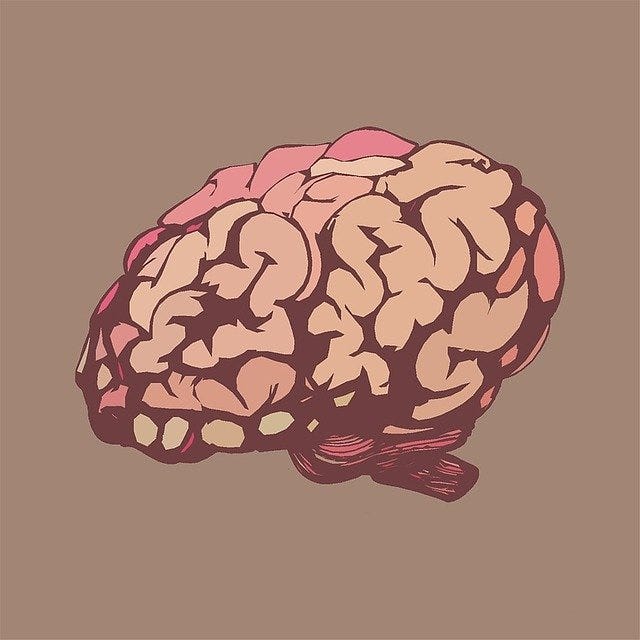Conspiracy Thinking May Kill Us All
What You Need to Know About the Conspiracy Mindset

Photo by Sammy Williams on Unsplash
(The following is a condensed excerpt from the chapter on conspiracism in my recent book The Minds of Mass Killers: Understanding and Interrupting the Pathway to Violence).
Conspiracy stories surround us. The tales have gotten stranger and stranger over time: alien lizard people kidnapping children and drinking their blood; cannibal “Deep State” cabals secretly running the government; Covid-19 vaccines that contain tracking devices and cause sterility. Though conspiracy theories have always been part of the human experience, we’ve seen a burgeoning in recent years, as flat-Earth proponents blend in with anti-vaxxers and those who maintain the moon landing was a hoax. As with other facets of extremism, conspiracy theories have been amplified and spread on social media.

Conspiracies and violence
Like other traits, conspiracism can also be viewed on a spectrum, ranging from mild suspiciousness about things that could be plausible to firmly held, bizarre beliefs that cannot possibly be true. While it’s theoretically possible that a group rather than a solo assassin killed JFK, it is odd to believe that JFK is still alive and secretly running The Illuminati.
There are reasons for this tendency that originate in our neurobiological system; it serves as a protective factor. Evolution has wired us to scan the environment for potential danger.
At the mild level, conspiracy theories have little consequence in an individual’s life. It’s not paranoid to occasionally wonder if people at work like us or if some are talking behind our back. Sometimes a boss really is out to get us.
Moving toward the higher end of the conspiratorial spectrum into the pathological territory, we see people building cohesive groups around paranoid themes, which typically involve an evil “other” seeking to cause harm to “the good people.” In this way, conspiracy theories build a sense of camaraderie among like-minded people who oppose a common enemy while building false narratives and feeding perceptual distortions.
Conspiracy theories serve to amplify hostility against other groups and seed “us versus them” thinking. When those with paranoid, psychopathic, and narcissistic traits become involved with conspiracies, it can lead to dehumanizing others and can become one ingredient in a recipe for violence.
Dangerous conspiracism stems from the amplification of a paranoid thinking style that has become maladaptive; we find this conspiracy mindset woven into the fabric of all extremist movements.
Put most simply, the common underlying tenets of conspiracist thinking are:
· Nothing is as it seems.
· Everything happens for a reason.
· Everything is connected.

Conspiracy detection system
Conspiracy theories are not new and are certainly not limited to the United States. Indeed, the tendency to be suspicious is part of human nature, and in past times may have served to help protect humankind from genuine threats. Many hypothesize that human beings evolved through natural selection with a “conspiracy detection system” integrated into our mental structure. This system is activated by environmental cues, which could indicate an increased risk of danger. This threat system served to help keep our hunter-gatherer ancestors safe in an environment characterized by constant threats from the natural world, as well as competition for resources from nearby groups. As with other aspects of our information processing system, what originally started about as adaptive can become maladaptive when amplified in modern times.
No matter how logical we believe ourselves to be, emotions and certain cognitive biases play a substantial role in perceiving the world and making decisions. Since our brains are pre-wired, these influences common to all of us operate beneath the level of conscious awareness.
Conspiratorial beliefs are not grounded in analytic thinking processes. They are motivated by emotional reasoning, which is when our emotions define reality apart from any actual basis in fact. Despite this, conspiracists typically expend a great deal of energy attempting to find rationale to support their belief, often citing “research,” which is nothing more than watching dozens of YouTube videos or reading articles online that contain false information. They are drawn to such material — which often contains scientific-sounding terms — as they desperately search for validation for their misperceptions.
The following are automatic cognitive processes that underlie the conspiracy mindset:
· Illusory pattern perception and errors of causality:
Humans automatically search for meaningful and causal patterns between stimuli they experience. This has been an essential factor in our survival as a species. Our ancestors learned to chart the days and seasons by perceiving patterns and the duration of pregnancy and cycles of crops. Understanding causal patterns allowed us to know which foods are safe to eat and which are poisonous.
But this doesn’t mean our perceptual system is infallible. Illusory pattern perception is when we erroneously connect the dots where there is actually no meaningful pattern. Errors of causality result when we perceive a cause-and-effect relationship between two events that are, in fact, not related.
For example, if I’ve worn a redshirt the day I buy a winning lottery ticket, I may interpret the “lucky red shirt” as causative. If I throw a penny in a wishing well the day I apply for a new job, I may cite the penny in the wishing well as a causative factor when I get the job. We avoid stepping on cracks or walking under ladders because “you just never know.” We refer to this thinking as superstition, and at low levels, it’s harmless. It comes naturally and makes us feel better; though illusory, it gives us a feeling of control.
· The illusion of control:
The randomness of life can be anxiety-provoking. There is no end to things that can go wrong in our daily lives, from car accidents to cancer to war. We worry about our loved ones, our family members, our pets, and climate change.
Anxiety is uncomfortable; we all seek ways to cope with it. Sometimes these coping methods are healthy, but sometimes they are not.
Paradoxically, conspiracy theories are a common maladaptive way of coping with anxiety by implying that we can influence events over which we have no power. They give us a false sense that we can organize and order our world.
If a mysterious malevolent cabal has overtaken our government, we believe we can fight them in various ways, including taking up arms or joining militias. This is particularly dangerous when we mistake political enemies for alien lizard people or believe that an entire race or gender of people is trying to harm us or that women are conspiring against men to deny them sex.
· Confirmation Bias
Our brains constantly curate what information we pay attention to. Confirmation bias is the tendency to only pay attention to information that supports our preconceptions and existing beliefs while ignoring or automatically rejecting conflicting information.
For example, a person who believes in ESP will keep track of instances when they were “Thinking about Dad, and then the phone rang, and it was him.” Yet they ignore the far more numerous times when they were thinking about Dad, and he didn’t call, and when they were not thinking about Dad, and he did call.
Confirmation bias is more robust for emotionally charged issues; it ensures that a person who is emotionally invested in a conspiracy theory only notices information that validates the conspiracy while ignoring and discounting any conflicting information.
· Specialness
Conspiracy theories are particularly seductive to those with a need to feel special since they promise “inside knowledge” outside the mainstream’s beliefs. Only those in the inner circle, the enlightened truth-seekers, know what’s really going on — even though their beliefs and perceptions are utterly wrong. This sense of specialness increases solidarity among members of a group who view themselves as insiders, more intelligent, and more aware than everyone else. They become self-aggrandizing heroes in a life or death battle against evil-doers. They want to believe their group is on the side of righteousness, and by the process of reciprocal reinforcement, they can convince each other of almost anything.
Human motivations common to all of us are what drive conspiratorial thinking. People are drawn to conspiracy theories because they meet psychological needs, including the drive to understand the world, feel safe and in control of our environment, and maintain a positive sense of self and social group.
Simple narratives that help us “connect the dots” appeal more to an anxious mind than the uncomfortable reality of coincidence and randomness. The unpredictable nature of the world is scary. It is less threatening to believe that a natural disaster is an evil cabal’s work than accepting randomness. We can arm ourselves and fight an evil cabal, but we can’t control Mother Nature.

Social factors and crises
Conspiracy theories are heavily influenced by social factors and can be activated by social situations. They become more appealing during times of crisis and social unrest when people are anxious and more apt to feel a loss of control. The sense of powerlessness becomes a driving force as people begin to perceive patterns in random noise. Unfortunately, conspiracy theories serve to amplify fear, and frightened people are more apt to become aggressive.
Predispositions and the Conspiracy Mindset
On the extreme high end of the spectrum, belief in conspiracies correlates with a range of individual traits such as paranoia, narcissism, Machiavellianism, and insecure attachments. While people with such predispositions will be more attracted to conspiracy theories than others, it’s also possible for consistent exposure to the conspiracy narratives to build these tendencies in some who would not usually go down the extremist rabbit hole.
It’s important to note that though conspiracy theories differ in content, the underlying belief processes are the same.
Many people believe in mutually incompatible conspiracy theories simultaneously, such as “Princess Diana was murdered” and “Princess Diana staged her own death.” The conspiracy mindset allows people to disregard facts and logic and believe almost anything. Once a conspiracy mindset is established, one conspiracy belief results in a person believing in countless other conspiracies. The single best predictor of belief in one conspiracy is a belief in a different conspiracy. This is known as “fringe fluidity.” Once a person has accepted one fringe belief, they readily embrace others.
Conspiracy beliefs are empirically associated with political extremism on both the far-left and far-right ends of the political spectrum and contribute to the radicalization of the vulnerable in both directions. As the United States has experienced increased political polarization and social unrest, conspiracy theories have increased accordingly.
In modern times, this common human tendency has been exploited by self-serving bad actors, from snake oil salesmen and unethical politicians to violent racists. It’s been amplified by social media, which efficiently spreads the conspiracy effects through their algorithms with bots. These algorithms tend to feed people shocking content designed to maximize their engagement on the platform. One conspiracy video on YouTube leads to dozens more appearing on the sidebar; this serves to rapidly build a massive online eco-system of the like-minded, which continues to amplify.
From QAnon, Pizzagate, and Trump’s Great Lie to anti-Covid-19 vaccine hysteria, social media serves as the accelerant, as conspiracists seek out information that supports their emotional reasoning.
Beliefs drive behavior, and conspiracies have consequences, even when they are entirely untrue. Conspiracies influence whether people vote, get vaccinated, take up arms to overthrow the government or murder members of a racial or religious minority. Anti-vaccine conspiracists are now responsible for filling our hospitals and causing tragic and unnecessary deaths.
We know that the more a message is repeated, the more people come to believe it’s true. The consequences of allowing this process to go unchecked are deadly. We all need to do our best to understand the emotional reasons that people latch on to these false beliefs while we vigorously continue to speak the truth. Lives depend on it.
Post a comment